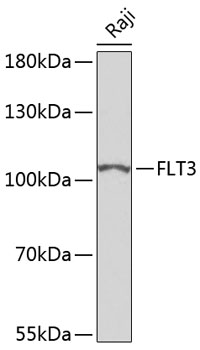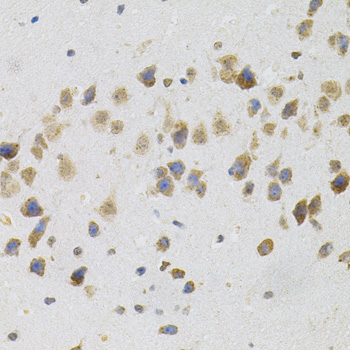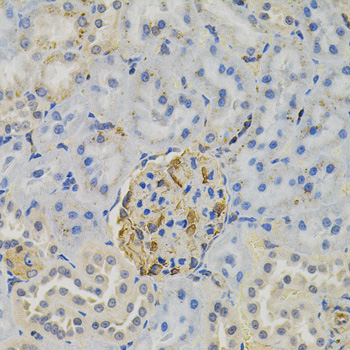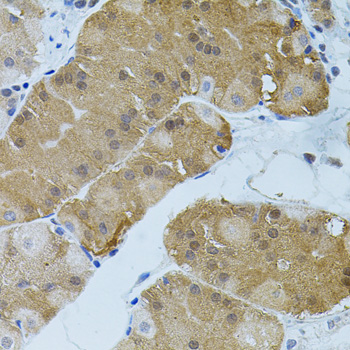Anti-FLT3 Antibody (CAB7897)
- SKU:
- CAB7897
- Product type:
- Antibody
- Reactivity:
- Human
- Reactivity:
- Mouse
- Reactivity:
- Rat
- Host Species:
- Rabbit
- Isotype:
- IgG
- Antibody Type:
- Polyclonal Antibody
- Research Area:
- Immunology
Description
| 抗体名: | Anti-FLT3 Antibody |
| 抗体コード: | CAB7897 |
| 抗体サイズ: | 20uL, 50uL, 100uL |
| 申し込み: | WB IHC |
| 反応性: | Human, Mouse, Rat |
| 宿主種: | Rabbit |
| 免疫原: | Recombinant protein of human FLT3 |
| 申し込み: | WB IHC |
| 推奨希釈: | WB 1:500 - 1:2000 IHC 1:50 - 1:100 |
| 反応性: | Human, Mouse, Rat |
| ポジティブサンプル: | Raji |
| 免疫原: | Recombinant protein of human FLT3 |
| 精製方法: | Affinity purification |
| ストレージバッファ: | Store at -20'C. Avoid freeze / thaw cycles. Buffer: PBS with 0.02% sodium azide, 50% glycerol, pH7.3. |
| アイソタイプ: | IgG |
| 順序: | Email for sequence |
| 遺伝子ID: | 2322 |
| Uniprot: | P36888 |
| セルラーロケーション: | Endoplasmic reticulum lumen, Membrane, Single-pass type I membrane protein |
| 計算された分子量: | 108kDa/112kDa |
| 観察された分子量: | 113kDa |
| 同義語: | FLT3, CD135, FLK-2, FLK2, STK1 |
| バックグラウンド: | This gene encodes a class III receptor tyrosine kinase that regulates hematopoiesis. This receptor is activated by binding of the fms-related tyrosine kinase 3 ligand to the extracellular domain, which induces homodimer formation in the plasma membrane leading to autophosphorylation of the receptor. The activated receptor kinase subsequently phosphorylates and activates multiple cytoplasmic effector molecules in pathways involved in apoptosis, proliferation, and differentiation of hematopoietic cells in bone marrow. Mutations that result in the constitutive activation of this receptor result in acute myeloid leukemia and acute lymphoblastic leukemia. |
| UniProt Protein Function: | FLT3: a receptor tyrosine kinase of the PDGFR family that binds the FL cytokine. FLT3 -/- mice have an impaired developmental capacity of primitive hematopoietic progenitor cells of all lineages with the greatest impact on lymphopoietic precursors. Activating mutations found in one third of cases of acute myeloid leukemia (AML), as well as in acute lymphoblastic leukemia, acute promyelocytic leukemia and myelodysplastic syndrome. Inhibitors: Sutent and PKC412. |
| UniProt Protein Details: | Protein type:EC 2.7.10.1; Kinase, protein; Membrane protein, integral; Oncoprotein; PDGFR family; Protein kinase, TK; Protein kinase, tyrosine (receptor); TK group Chromosomal Location of Human Ortholog: 13q12.2 Cellular Component: endoplasmic reticulum; integral to plasma membrane; plasma membrane Molecular Function:hematopoietin/interferon-class (D200-domain) cytokine receptor activity; protein binding; protein homodimerization activity; protein self-association; transmembrane receptor protein tyrosine kinase activity; vascular endothelial growth factor receptor activity Biological Process: B cell differentiation; cytokine and chemokine mediated signaling pathway; hemopoiesis; leukocyte homeostasis; lymphocyte proliferation; myeloid progenitor cell differentiation; peptidyl-tyrosine phosphorylation; positive regulation of cell proliferation; positive regulation of MAP kinase activity; positive regulation of MAPKKK cascade; positive regulation of phosphoinositide 3-kinase activity; positive regulation of phosphoinositide 3-kinase cascade; positive regulation of tyrosine phosphorylation of STAT protein; pro-B cell differentiation; protein amino acid autophosphorylation; regulation of apoptosis; transmembrane receptor protein tyrosine kinase signaling pathway Disease: Leukemia, Acute Lymphoblastic |
| NCBI Summary: | This gene encodes a class III receptor tyrosine kinase that regulates hematopoiesis. This receptor is activated by binding of the fms-related tyrosine kinase 3 ligand to the extracellular domain, which induces homodimer formation in the plasma membrane leading to autophosphorylation of the receptor. The activated receptor kinase subsequently phosphorylates and activates multiple cytoplasmic effector molecules in pathways involved in apoptosis, proliferation, and differentiation of hematopoietic cells in bone marrow. Mutations that result in the constitutive activation of this receptor result in acute myeloid leukemia and acute lymphoblastic leukemia. [provided by RefSeq, Jan 2015] |
| UniProt Code: | P36888 |
| NCBI GenInfo Identifier: | 156630887 |
| NCBI Gene ID: | 2322 |
| NCBI Accession: | P36888.2 |
| UniProt Secondary Accession: | P36888,Q13414, A0AVG9, B7ZLT7, B7ZLT8, F5H0A0, |
| UniProt Related Accession: | P36888 |
| Molecular Weight: | 113kDa |
| NCBI Full Name: | Receptor-type tyrosine-protein kinase FLT3 |
| NCBI Synonym Full Names: | fms related tyrosine kinase 3 |
| NCBI Official Symbol: | FLT3 |
| NCBI Official Synonym Symbols: | FLK2; STK1; CD135; FLK-2 |
| NCBI Protein Information: | receptor-type tyrosine-protein kinase FLT3 |
| UniProt Protein Name: | Receptor-type tyrosine-protein kinase FLT3 |
| UniProt Synonym Protein Names: | FL cytokine receptor; Fetal liver kinase-2; FLK-2; Fms-like tyrosine kinase 3; FLT-3; Stem cell tyrosine kinase 1; STK-1; CD_antigen: CD135 |
| Protein Family: | Flt3 receptor-interacting lectin |
| UniProt Gene Name: | FLT3 |





